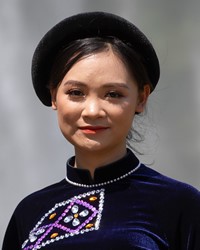Tay in Vietnam

Photo Source:
Copyrighted © 2026
Jimmy Tran - Shutterstock All rights reserved. Used with permission |
Send Joshua Project a map of this people group.
|
| People Name: | Tay |
| Country: | Vietnam |
| 10/40 Window: | Yes |
| Population: | 1,926,000 |
| World Population: | 1,926,000 |
| Primary Language: | Tay |
| Primary Religion: | Ethnic Religions |
| Christian Adherents: | 1.00 % |
| Evangelicals: | 0.03 % |
| Scripture: | Complete Bible |
| Ministry Resources: | Yes |
| Jesus Film: | No |
| Audio Recordings: | Yes |
| People Cluster: | Zhuang |
| Affinity Bloc: | Southeast Asian Peoples |
| Progress Level: |
|
Introduction / History
To avoid the Mongol hordes in the 1300s, ancestors of the Tay migrated south from China into what is now Vietnam. There they refused to submit to a Hmong king. He orchestrated a 12-year campaign against the Tay, and many of their villages were burned and the people scattered.
At the end of the 1700s, when Vietnam was in chaos, several ethnic groups united with the local groups of Thai-speaking peoples. These people became known as the Tho. Today, they are regarded as an official minority in Vietnam. They prefer to be known as "Tay," since the term "Tho" is now considered derogatory. The Tay are similar in language and culture to the Nung people.
Traditionally, the Tay were master hunters. They used traps, cages, and automatically triggered arrows. Today, they hunt very little because of the changed ecological conditions.
What Are Their Lives Like?
The Tay usually build their villages near sloping mountains between the high mountains and the plains of southeast Asia. They usually live near a river for their water supply. They grow wet rice and use slash-and-burn techniques to grow dry rice, maize, buckwheat, watercress, sugar cane, and other vegetables. They grow hemp and use it for making bags and nets for fishing. They sell or exchange products for household items and use forest products for food.
The Tay mainly live in houses built on the ground. These houses are private property, as are their accompanying gardens. However, there are still some Tay who live in houses built on stilts. The architecture of these homes is simple, without the fancy gables and decorative work commonly seen on other houses. Today, nearly all the Tay are part of a collectivized agricultural program in the form of community (collective) farms. Farmland is seen as community property that people are free to use but not own.
Villages used to be the center of economic activity, with local markets rotating among a series of villages and trading mainly with the Vietnamese and Chinese communities. Today, however, the Tay have been primarily assimilated into the Vietnamese society.
Tay families are usually small and the line of descent is traced through the father. Children begin school at six years of age and older. There, they begin studying the Vietnamese language. Young people choose their own marriage partners, and after a betrothal ceremony, they perform many marriage rituals. The groom is expected to work for the bride's family as payment.
What Are Their Beliefs?
A lot of reverence for spirits of ancestors pervades the society. Family and community prayers are conducted in shrines as they chant incantations to the spirits. The skulls of ancestors are kept in the clan caves. Prayers are made over the skulls for they are believed to bring good favor. Tribal spirits are revered but they guard and affect their territory, only. Today only a few Taveta follow these traditions because many have integrated with the national culture.
What Are Their Needs?
The Taveta church in Kenya is stronger than the one in neighboring Tanzania. Kenyans need to go to them with the gospel.
Prayer Points
Ask the Lord to call people to share Christ, plant churches, and disciple them in the ways of Jesus Christ.
Ask God to strengthen, encourage, and protect the small number of Tay Christians.
Ask the Holy Spirit to give Tay family leaders a hunger and thirst for righteousness that will draw them to Jesus Christ.
Pray for them to easily access oral Bible materials and gospel recordings.